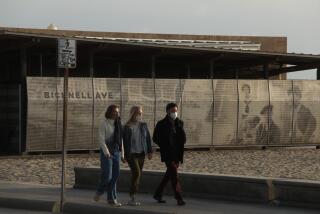Ernest S. McBride, 97; Long Beach activist battled discrimination
- Share via
Ernest McBride, a civil rights pioneer who co-founded the Long Beach chapter of the NAACP and whose home was declared a landmark for its place in the city’s history, has died. He was 97.
McBride died Saturday of complications related to old age at his daughter’s home in Long Beach, said his son Ernest McBride Jr.
“We’ve lost a great American,” state Sen. Alan Lowenthal (D-Long Beach) told The Times on Tuesday. “He really led the fight against discrimination in Long Beach and did so with great wisdom and understanding.”
The struggle started in 1930 after McBride came to California from Arkansas and the Mississippi Delta of his childhood hoping to escape racial prejudice. Instead, he was greeted by a sign in a cafe in the Long Beach Harbor area that declared: “We don’t serve coloreds here.”
Yet he chose to stay in the region.
“I decided I had to stop and fight somewhere,” McBride told The Times in 1995. “And I decided Long Beach was where I was going to stop.”
After he married in 1934, he struggled to find someone willing to rent to a black couple in Long Beach and they ended up living in Wilmington. The experience influenced his decision to found a local branch of the National Assn. for the Advancement of Colored People.
“He wanted to have something to fight with,” his son said.
Among his NAACP co-founders were teammates on the Wilmington Giants, a Negro Baseball League team that McBride played on.
Through the NAACP, McBride worked to integrate the Long Beach Police Department, the naval shipyard, Coles Market and General Telephone Co. He also organized a student revolt that forced local school officials to abandon blackface minstrel shows.
He was “a freedom fighter for everything the NAACP stands for,” Naomi Rainey, president of the Long Beach branch of the NAACP, told The Times. “Because of Mr. McBride, our city can boast today of its diversity and inclusiveness.”
Beginning with his first job -- on an all-black crew that loaded cotton in a port in San Pedro -- he battled discrimination. He discovered that his crew was making less than the previous workers, Latinos who had been fired after asking for a raise. McBride quit and fought to unionize them.
McBride told The Times in 1995 that he helped bring in a union while working as a supermarket janitor and was fired as a shipyard electrician because he refused to sign a loyalty oath during the McCarthy era.
Later, he became an auto mechanic before retiring in 1972.
Ernest Samuel McBride was born Nov. 12, 1909, in Carrollton, Miss., one of seven children of a Mississippi Delta farmer.
At 8, he moved to Arkansas and attended a segregated school.
After high school, McBride played baseball with the Memphis Red Sox of the Negro Baseball League but soon quit because it paid poorly, his son said, and he came west.
In 1948, McBride bought a Craftsman bungalow for $9,500 on Lemon Avenue in Long Beach despite racially restrictive covenants and a petition by white neighbors to keep his family out.
The home became a regular meeting place for the NAACP and was recognized in 1994 by the Long Beach City Council for its historic significance.
It’s “too bad we can’t designate Ernie ... a historic monument,” Lowenthal, then a Long Beach councilman, told The Times in 1995. “He really is the landmark.”
In addition to his son Ernest, McBride is survived by another son and three daughters, 10 grandchildren and 19 great-grandchildren. Lillian, his wife of 60 years, died in 1994.
A service will be held at 11 a.m. Saturday at New Hope Baptist Church, 1160 E. New York St., Long Beach.
*
More to Read
Sign up for Essential California
The most important California stories and recommendations in your inbox every morning.
You may occasionally receive promotional content from the Los Angeles Times.














